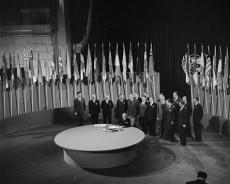
Email: ZYVC057@live.rhul.ac.uk
Total Article : 213
About Me:I'm a graduate student studying International Criminal Law and first started writing for King's News almost 4 years ago! My hobbies include reading, travelling and charity work. I cover many categories but my favourite articles to write are about mysteries of the ancient world, interesting places to visit, the Italian language and animals!

The League of Nations appeared to be a promising and pragmatic result of post-war settlements aspired to prevent future wars and subjugate any interstate polemics. Nonetheless by 1946 the League was dissolved, having failed in its ultimate goal to prevent war, and a new International Organization, known as the United Nations, took its place as the platform for addressing world issues and promoting formidable relations between countries.
Realism and Liberalism have both formed their own specific outlook on the role and the efficiency of international organizations, and will facilitate the process of examining how the United Nations can justify its reputation of being the ‘creation for states by states’ and a vast improvement on previous international organizations.
According to classical realists, international organizations form an ‘anarchic realm’ and are deprived of any executive power, their own existence relies on the acceptance of other countries recognizing the organization. Liberals challenge this theory as they perceive international organizations as a means of enhancing prosperity on a global scale while maintaining order in socially adaptive states. In fact in the light of liberalism, the United Nations is seen as the epitome of diplomacy and a great improvement on the League.
The Security Council underwent vast transformations during the establishment of the United Nations which aimed to improve its effective power, hence avoiding further inefficiencies such as Italy’s expansionistic programmes in Ethiopia or, worst of all, Hitler’s decision to invade the Rhineland in 1936. The urgency to increase the Council’s executive power is found in article 43, of the UN Charter according to which all countries should put at the disposal of the UN security council ‘armed forces, assistance and facilities, including rights of passage, necessary for the purpose of maintaining international peace and security’ and by article 45 ‘urgent military measures’ are introduced as ‘members shall hold immediately available national air-force contingents for combined international enforcement action.’. The Yom Kippur War of 1973 between Israel and the Arab coalition formed by Syria and Egypt ended due to the intervention of the UN and its reiterated resolutions and ultimatums for peacekeeping. In the nineties, the UN carried out more actions for ‘peacekeeping’ than it had ever done since that date. Based on the empirical evidence in many similar cases, one cannot fail to recognize that in regards to exercising power the UN proves to be a betterment compared to the League.
The League was founded after World War One when global threats ceased to interfere with diplomatic relations, when hostilities were quietened and the Peace Settlement was prioritized. In contrast to this, negotiations regarding the UN commenced during World War Two, when the will and determination to annihilate war and its horrors was fresh in diplomats minds. Extensive preparation along with a stronger Charter which established the need for executive power and permission to intervene, on behalf of the Secretariat, to maintain order, subdued any fears of turning into a ‘death letter regime’ thanks to articles 98 and 99. The ‘big states’ in the aftermath of World War Two were fully aware that striving for a just treaty would be a temporary outcome, a mild appeaser, so they gave the Charter a futuristic long-term outlook. This is looked upon as a great improvement on the League, which aimed above all to secure peace post war whilst failing to bring countries together through a new form of diplomacy. The League Convent was never signed by many key countries and ‘The League became an empty shell abandoned by countries unwilling to involve themselves outside their domain or give teeth to the League’s Covenant’ (Clive 2001, 20). The United Nations Charter was signed by a significantly larger number of states and this enhanced its prominence as a new and improved liable organization.
The League’s concern with creating a stable and effective global organization to deal with an array of issues never reached universality and was strongly undermined due to the many qualms and bickering between powers such as the UK and France regarding the implementation of the Treaty of Versailles. Instead the 193 countries which adhere to the UN emphasise its universality. Whilst the UN jumpstarted from points of particular interest to the League, it went on to developing in fields overlooked by its predecessor, such as the question on colonies and social or economic aspects of each state incorporated in an international system. The UN embraced the fast-pace of globalized politics unlike the League which ultimately led to its vast improvement.
Image: http://upload.wikimedia.org/wikipedia/en/8/88/Chile_signs_UN_Charter_1945.jpg

0 Comment:
Be the first one to comment on this article.